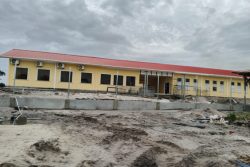(Jamaica Gleaner) While the decision of Panther Corporation, the Canadian recycling firm, to set up shop in Jamaica is being welcomed there are renewed fears that the country could drown in plastic bottles.
Environmental lobbyists are warning that the country’s failure to establish legislation to encourage the purchasing of used plastic bottles, as well as the use of the environmental levy for other than its intended purpose is pushing some local firms out of the recycling business.
“Jamaica could have a recycling industry yes, but certain things that are to be in place are not. So, yes, it’s not viable, because what is happening now is not long-term in my opinion,” said Diana McCaulay of the Jamaica Environment Trust.
“Paying for the plastic so people have an incentive to bring in the plastic is potentially a viable thing. But my understanding that the margins on the plastic bottles, that is, the difference between what it costs to collect and store, ship them and then sell them, is not enough to pay people,” added McCaulay.
According to her, there are only a few ways in which recycling business can be funded, and in some countries it is done via deposit legislation.
“That is a law that says, if you have a plastic bottle you have to charge a deposit on it. Essentially the person selling has to take back the bottle. Once you do that, there is an economic incentive,” she stated.
Just not viable
One major player in the local plastic bottle recycling market is now undecided about continuing as he argues that it is just not viable.
The operator, who asked that his name be withheld, said persons in the business of collecting plastic bottles and shipping them overseas for recycling are not breaking even.
“People want money for plastic. We can’t afford to pay, because there is currently no demand for the product. The price is going down on the world market,” the operator said.
McCaulay agreed and argued that for the industry to become viable it must become capital and machine intensive.
In Jamaica there is currently no deposit legislation as traders in plastic have strongly resisted lobby for such legislation, McCaulay said while adding that direct taxation will assist small operators with less resources.
Also called a packaging tax in some countries, the tax is applied in Jamaica, but the recycling programme it was supposed to support, has not been implemented.
“The programme was never implemented, but the tax is being collected,” she stated.
The Environmental Levy passed in 2007, but was repealed in May on imports from CARICOM.
However some Jamaican manufacturers say it will put the industry at a disadvantage compared to Trinidad and Tobago.
The 0.5 per cent levy is charged on all imports and goes to the coffers of the central treasury. However during the discussion, it was proposed to fund recycling and proper garbage management at Riverton City as well as support some of the national parks.







